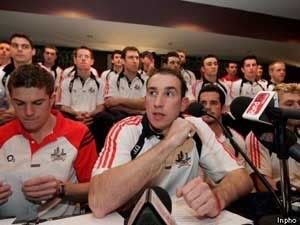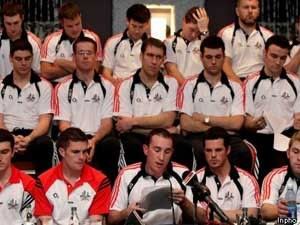Joseph Sexton caught up with former Hurler of the Year Seán Óg Ó hAilpín after the hurling supporters march last Saturday. Humbled by the depth of the public support, this is what he had to say.

12 days ago, you and your fellow players made an appeal to the Cork public for support. Do you feel the players' call for support has been answered today?
"You know what? We more than got it today. It was very humbling. It wasn’t easy at the time asking for it, because it’s hard to quantify a figure for how many would turn out, but this superseded our expectations. There was a tear nearly came out of my eye, because it’s a Saturday in February, people have other things to be doing and other worries with the economy, sport and hurling won’t be on top of the agenda. These people, all these men, women and children came out today to show their support and voice their frustration. We share their frustration. These people want to see the Cork team back, and want to see the best Cork team possible that will bring pride and honour to the jersey. If the support today is anything to go by, then it’s very encouraging."
How important was it for you to receive the public support of the footballers the other night?
"I think it was huge, because up until now people didn’t know what the footballers were going to do. They were staying silent. But you know, I know most of the footballers well and nobody put them under pressure in any way. This time last year, they had their own problems and the hurlers supported them, and I know they’ve never forgotten that. If it’s one problem, maybe you can bury your head in the sand, but it isn’t and now the footballers are saying they’ll down tools now if things aren’t sorted. I think the county board executive have to take a look at themselves, and then come back with actions to resolve the situation before things get any worse."
We’ve heard a lot of speculation in the press that the panel are not united, that the younger players have been intimidated, and suggestions that you should all shut up, get back on the field, and say no more. What do you have to say to people who are saying this?
"I think that was the beauty of the press conference, because there were loads of rumours floating about and we had the chance to put them to bed once and for all. It was a united 30 players on show that night, there was no fellas putting any other fellas under pressure, and it’s simple; the reason why these 30 players are taking this stance and holding press conferences is because there is a problem there. If there was no problem, then there’d be none of this. The problem, as we see it, doesn’t lie within ourselves, it lies within the county board executive. We’ve answered as many questions as we can from our side... The questions have been put to them and they need to answer, not just to the players, but the the Cork public. There are supporters out there who, week-in, week-out, pay money out of their own pockets to attend the matches, and that’s money that goes back to the county board. Hard, well-earned money. They have a responsibility to tell the Cork public what went on with the appointment of Gerald McCarthy, because that’s the source of the problem. They didn’t, in my opinion, appoint him for the right reasons, for the interests of Cork hurling, or those of the people who turned out here today."
How is morale in the camp? Do you think this will be a big boost, seeing this degree of support?
"Before today, I was a bit apprehensive, d’ya know. Would there be a big crowd, because you know, if there was no big turnout, well... it would have looked a small bit embarrassing for us. But we got more than we could have ever dreamed of, and these people... they love their sport, they love their hurlers, and they want the best hurlers back. For a player, looking at that up on the stage, it’s very encouraging. It shows that, despite all that’s been said, we’re still loved, and people appreciate what we’re doing. We have no problem putting in a massive sacrifice, putting in 14 sessions a week, and driving here and there; we have no problem with that, provided we get the support back. We got that here today from the supporters, and we need that to be shown by the County Board executive too. Morale is very good amongst the players. The more the County Board drags its feet, the more strongly the players feel what we are doing is right. There’s a unity there, which was present for all to see at the press conference. If you have three fellas and you try and break them, it’s one thing; but when you have 30 guys, it’s going to be hard, so look... we’re still as united as ever."
(Photography, again, courtesy of Mark Jacob)














